Britain's Little Secret
Excellent golf, cheaper prices and spectacular sightseeing in lesser-known Wales
Dale LeathermanWales is a dynamite golf destination, with courses that are every bit as historic and dramatic as famous venues in other United Kingdom countries. Because Wales is not as well known, tee times are easy to get and prices for everything—lodging, meals, greens fees—are cheaper.
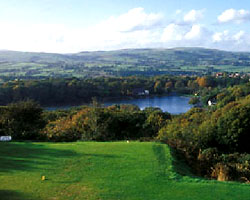 Shortly after our arrival in Wales we passed the hill/mountain that inspired the 1995 movie The Englishman Who Went Up a Hill But Came Down a Mountain. Residents of a small village carried baskets of dirt to pile atop their hill until it qualified as a mountain.
Shortly after our arrival in Wales we passed the hill/mountain that inspired the 1995 movie The Englishman Who Went Up a Hill But Came Down a Mountain. Residents of a small village carried baskets of dirt to pile atop their hill until it qualified as a mountain.
In a place where the legend of King Arthur still lives, somehow anything makes sense and all things are possible.
Standing on the first tee of the Llandrindod Wells Golf Club in mid-Wales, I faced another hill which should be declared a mountain—the first fairway. Behind the tee, about 1,000 feet below, lay the Victorian spa town of Llandrindod Wells. It was in its heyday in 1905 when Harry Vardon mapped out golf holes on this bit of high pastureland.
A foursome of knickers-clad senior citizens walked in from the eighteenth green—their steps light, their calf muscles corded like cedar knots. They paused, grinning, to watch us Americans. My friends and I hit our drives, then began to climb, dragging our bags on two-wheeled trolleys and trying not to wheeze until we were out of earshot.
Soon my legs and lungs became accustomed to the task, and I found myself under Vardon's spell. We followed his sheep-mown fairways across the moorland plateau, over ancient stone walls and turf banks to good, true greens, always with a panorama of valleys and far hills. Llandrindod Wells is spiced with many blind shots and fairways that drop steeply before rising to tabletop greens.
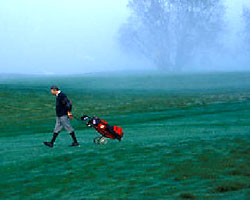 Later we drove northwest through a countryside studded with castles (Wales has more castles per square mile than any other country) to Aberdovey, a picturesque resort town. Western Wales runs into the sea at nearby Cardigan Bay, home to some of the purest links-style golf terrain in the United Kingdom.
Later we drove northwest through a countryside studded with castles (Wales has more castles per square mile than any other country) to Aberdovey, a picturesque resort town. Western Wales runs into the sea at nearby Cardigan Bay, home to some of the purest links-style golf terrain in the United Kingdom.
Our lodging was in the dockside Harbour Hotel, a Victorian inn above a cozy pub serving local mussels, steaks and foamy Guinness Stout. Over dinner we discussed the contrast between the first two courses we had played.
Arriving in London's Heathrow Airport, we drove 90 minutes into Wales, settling in for our first two nights at the modern five-star Celtic Manor Resort near Newport. Set on 1,400 parkland acres, the resort is huge (364 rooms and suites), with superb accommodations, dining and spa. The courses were more difficult than Landrindod but, in retrospect, more "Americanized" as well, with motorized golf carts and finely groomed fairways.
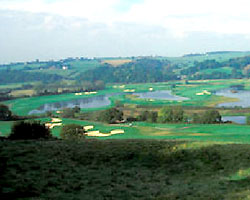 The late Robert Trent Jones Sr., who was born in nearby Aberystwyth, designed the par 69, 6,685-yard Roman Road Course, opened in 1995. The layout, which follows an ancient hillside route overlooking a Roman village, is a tough collection of blind shots, long holes, canted lies, and steep rises and drops. The late master was also responsible for the par-three Coldra Woods (opened in 1996), one of the finest short courses in Great Britain.
The late Robert Trent Jones Sr., who was born in nearby Aberystwyth, designed the par 69, 6,685-yard Roman Road Course, opened in 1995. The layout, which follows an ancient hillside route overlooking a Roman village, is a tough collection of blind shots, long holes, canted lies, and steep rises and drops. The late master was also responsible for the par-three Coldra Woods (opened in 1996), one of the finest short courses in Great Britain.
Robert Trent Jones Jr. trumps his father with his new par 72, 7,403-yard Wentwood Hills Course, which will host the 2010 Ryder Cup. The course catches fire on the 613-yard second hole, which emerges from a forest track to reveal the front nine spread out spread out below in the pretty Usk River Valley. The steeply descending third and fourth holes merge into a flat river plain rife with water and sand hazards. On the thirteenth hole the climb from the valley begins a long uphill battle to the very end.
Neither Celtic Manor nor Llandrindod Wells prepared us for the wild beauty of the Aberdovey Golf Course on Cardigan Bay. The course, which lies in a narrow strip of linksland between sea and hills, was founded in 1892, but locals say their grandfathers played here in the 1880s using flowerpots sunk into the turf for cups.
The cups are no longer flower pots, and electric wire protects the greens from grazing sheep and cattle—but little else has changed on this classic links layout. The sea roars unseen behind a range of high dunes, and wind swirls over the crests to trifle with lofty shots. Narrow fairways snake through a maze of gorse-covered mounds. Some tees are positioned atop the dunes for a view of sea and fairway.
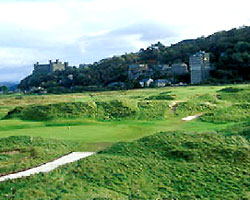 Heading north along Cardigan Bay to Dolgellau, we arrived at Penmaenuchaf Hall in time to watch the sun set over the Mawddach Estuary. Built in 1860 as a country house for a cotton magnate, the gray stone manor is now a 14-room luxury inn with modern amenities. We walked down to the waterfront for a drink at the historic George III tavern, then sat down to a feast before the fireplace in the inn's dining room.
Heading north along Cardigan Bay to Dolgellau, we arrived at Penmaenuchaf Hall in time to watch the sun set over the Mawddach Estuary. Built in 1860 as a country house for a cotton magnate, the gray stone manor is now a 14-room luxury inn with modern amenities. We walked down to the waterfront for a drink at the historic George III tavern, then sat down to a feast before the fireplace in the inn's dining room.
Our next round was on the legendary Royal St. David's Golf Course in Harlech, ranked in the world's top 50 by Britain's Golf World and Golf Monthly magazines, and often described as the world's toughest par 69. Overlooking the course is Harlech Castle, a stunning fortress built in the 13th century by Edward I to subdue the Welsh. Over the years the sea receded from the base of the castle, leaving the strand of linksland occupied by Royal St. David's since 1894.
Almost every hole changes direction, which also changes the effect of the wind among the gorse-covered dunes. A cluster of mounds protects the par-three fourteenth hole, so hitting to it is rather like dropping an egg in a nest. The par five fifteenth hole (one of the top 500 holes in the world) calls for a drive over dunes to a narrow fairway lined with mounds all the way to the green.
We set off cross-country then, bound for the capital city of Cardiff and another St. David's—the glass-and-steel tower of the St. David's Hotel and Spa on the Severn River. The hotel was a great base for day trips along the stunning south coast of Wales, where we had a choice of fine links courses.
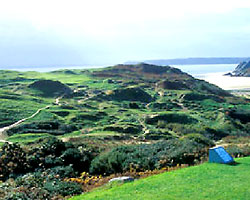 Any visiting golfer's list should include Royal Porthcawl, the 1995 Walker Cup venue which Europeans consider one of the world's top courses. On paper, one could wonder why. It's a 6,691-yard par 72 with no dunes, ditches or landmarks, not even a tree. Playing it is a different story, one well worth the 70-pound tariff. Beautiful Swansea Bay is never out of sight. The first three holes skirt the pebble-strewn coast of Rest Bay, where seagulls like to steal your ball and the wind whips across a 300-yard-wide beach at low tide. The last four holes return to the sea, challenging a wind that can blow a dead-on drive off at right angles to the fairway. Some of the sand bunkers could conceal a tank.
Any visiting golfer's list should include Royal Porthcawl, the 1995 Walker Cup venue which Europeans consider one of the world's top courses. On paper, one could wonder why. It's a 6,691-yard par 72 with no dunes, ditches or landmarks, not even a tree. Playing it is a different story, one well worth the 70-pound tariff. Beautiful Swansea Bay is never out of sight. The first three holes skirt the pebble-strewn coast of Rest Bay, where seagulls like to steal your ball and the wind whips across a 300-yard-wide beach at low tide. The last four holes return to the sea, challenging a wind that can blow a dead-on drive off at right angles to the fairway. Some of the sand bunkers could conceal a tank.
Pennard Golf Course, perched on the cliffs overlooking Three Cliffs Bay, is, in a word, unforgettable. Designed in 1896 by James Braid, Pennard is often called "links in the sky" because it has all of the mounds, gorse and sand of a seaside course as well as the views of a mountain layout. Near the seventh fairway, wild ponies graze in the ruins of Pennard Castle. Facing southwest from the seventh green and eighth tee, Three Cliffs Bay and its wide sandy beach fill the horizon. Holes sixteen and seventeen are close to the bluffs where the wind lays siege.
Leaving Wales, I knew we had only scratched the surface of golf in this undiscovered corner of Great Britain. Wales, the smallest British country, is about the size of Massachusetts but has nearly 200 golf courses. Most have quite reasonable greens fees. The countryside, from the mountains to the coastline, is largely rural, unspoiled and incredibly beautiful. Only five percent of Britain's population lives here. The country is a natural not only for golf, but also for walking, climbing, riding, fishing and adventure sports. Tourism is Wales' top industry, and there are few places in the world which are safer or friendlier to visitors.
PARTICULARS:
Aberdovey Golf Club, Aberdovey — 011-44-1654-767493
http://www.aberdoveygolf.co.uk
Celtic Manor, Newport — 011-44-1633-413000
http://www.celtic-manor.com
Llandrindod Wells Golf Club, Llandrindod Wells — 011-44-1597-823873
http://www.llandrindod.co.uk
Pennard Golf Club, Swansea — 011-44-1792-233131
http://www.welshgolfcourses.com/south/pennard.php
Royal Porthcawl, Porthcawl — 011-44-1656-782251
http://www.royalporthcawl.com
Royal St. David's, Harlech — 011-44-1766-780361
http://www.harlech.com/golf.html
Harbour Hotel — 011-44-1654-767250
http://www.harbour-aberdovey.co.uk
Penmaenuchaf Hall — 011-44-1341-422129
http://www.penhall.co.uk
St David's Hotel — 011-44-2920-454045
http://www.thestdavidshotel.com
For information on Wales: http://www.tourism.wales.gov.uk

